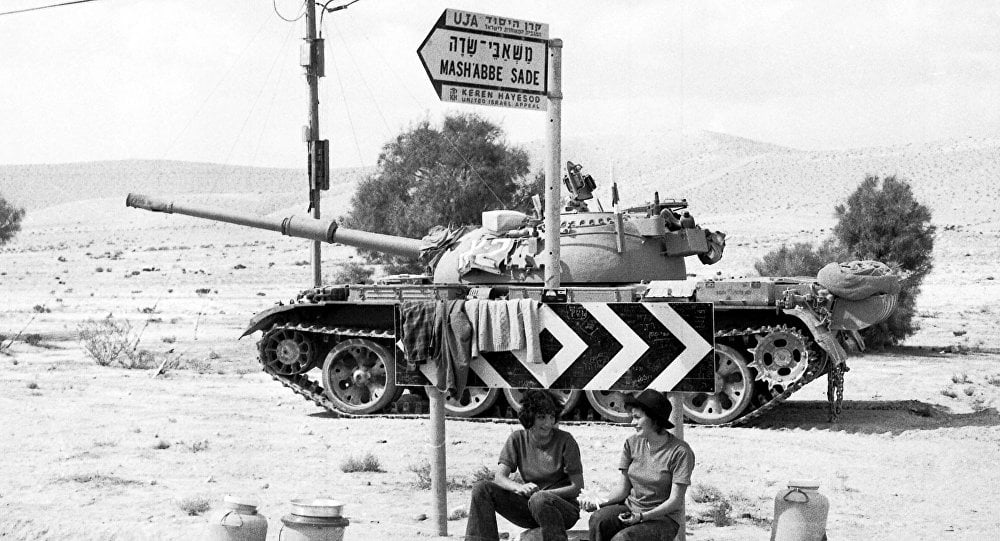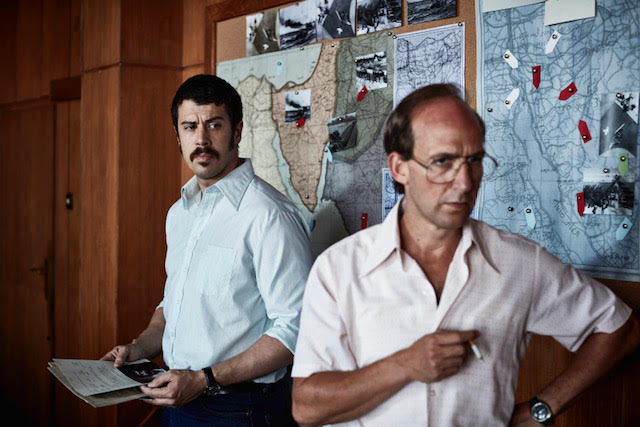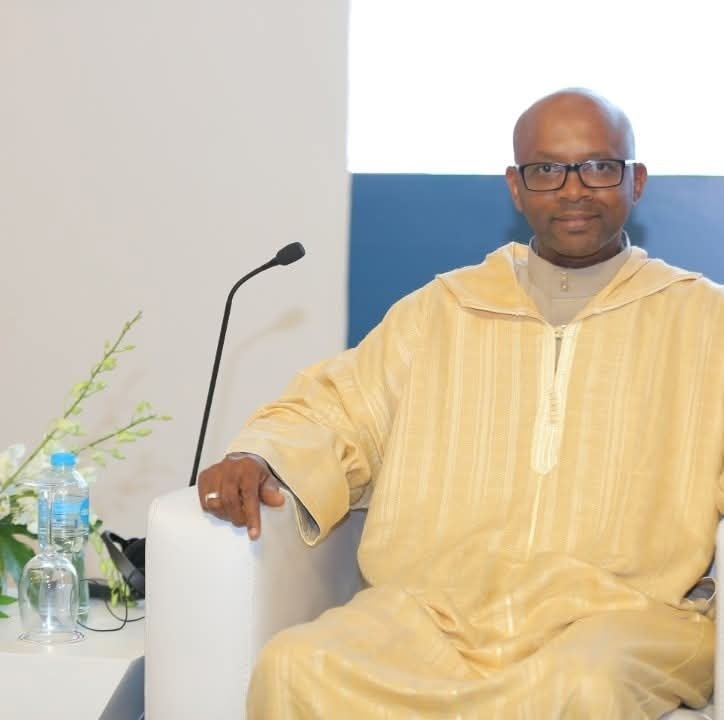
By Emad El-Din Aysha, PhD*
Just watched The Angel (2018), the so-called Ashraf Marwan story (President Abdel Nasser’s son-in-law), purely out of curiosity. And I’m glad to say I did not like it. That’s not just on account of my personal and political biases. Marwan Kenzari, playing the aforementioned son in-law, wasn’t half bad, the Qaddafi scene was nice and some of the Mossad agents and scenes were convincing. But the film is fatally flaws and falls flat on its face at almost every juncture in the storyline.
Not only is it a ‘bad’ movie, as a movie, worse still it is a silly movie, and testament to just how ignorant the Israelis are of their Arab neighbours.
Reading between the Dividing Lines
The central problem with the movie is that it’s not a movie to begin with, historical or otherwise. It’s a party political broadcast. You can see this from the opening sequence when the erstwhile hero blabbers away about the 1967 War and the not-so-immediate aftermath. The voice of Ashraf Marwan begins by saying that the war happened during ‘The Summer of Love’, which is not an expression Arabs understand or have even hear of. (Why would anyone fall in love in the summer in the blazing heat in an Arabic country? That’s also why we prefer Autumn to Spring). He adds, predictably (if you speak English): “But can the idea of love and peace really bring about change to a world living on the edge of war?”
He says this in hushed tones, which is the pacifistic way he speaks throughout the movie, then trots out a series of half-truths and downright lies about what happened in 1967:
“In the Middle East, long-simmering tensions are about to burst into flames. Egypt’s popular President, Gamal Abdel Nasser, gathers the entire Arab nations to join him in war against Israel. Nasser blocks Israel’s shipping channels through the Straits of Tiran. War seems inevitable. Israel responds with a devastating surprise attack. Within a matter of a few hours, the entire Egyptian Air Force is destroyed. Despite Syria and Jordan coming to Egypt’s aid, fighting on three fronts... Israel goes on to win the war in only six days. The Sinai Peninsula, Golan Heights, and the West Bank, including East Jerusalem, fall to Israel. As the Arab nations plot to regain their lost territories, certain Palestinian nationalist groups, living under Israeli rule in the occupied territories... start to plan their retaliation.”
What complete and utter balls!
Abdel Nasser didn’t gather anybody. He rallied them, called on them, but there was no joint command structure with Egypt at the helm and the amassed forces of the entire Arab world, from Morocco to Bahrain, in Sinai. And Israel most definitely did not fight on three fronts at the same time. The Syrians in particular, its airforce which wasn’t attacked till way at the end of the war, didn’t fire a single shot at the Israelis when almost all the Israeli airforce was preoccupied with bombing the Egyptians. As for King Hussein of Jordan, more on him below, he only fired a couple of warning shots at the Israelis, in an effort to look good on account of the ramshackle alliance he’d forged with Abdel Nasser, against his better judgement. Jerusalem fell without a fight, as the Jordanian army was commanded to withdraw from the whole West Bank. Abu Dawoud, of Black September fame, was actually there in the holy city and saw this with his own eyes.
There was no real war, on the Arab side, even on the Egyptian side with Abdel Nasser taking a defensive posture to gain international sympathy, under advice from De Guelle. It was his poor friend Abdel Al-Hakim Amer, the head of the army who wanted to launch a pre-emptive strike against the Israelis, something the ‘popular’ Egyptian leader was steadfastly against. And the ‘tensions’ that lead to Abdel Nasser closing off the Red Sea to the Israelis was on account of the charge that the Israelis were amassing forces on the Syrian border (see below).
More than that, look at the condescending tone that the Arab speaker is taking, describing the Arabs as ‘plotting’ to retake their stolen territories. You don’t plot and scheme to take what’s rightfully yours. You plot and scheme to take what rightfully belongs to someone else.

Even if Ashraf Marwan was an angel of peace and offered his services to the Israelis to avoid another war, would he really describe past events in such a way? He’s only supposed to have become a peacenik on account of the crushing defeat in 1967. Then again, that’s the whole message of the movie, the Arabs should accept the situation as it is and do peace instead, without regaining what’s rightfully theirs. The whole thing about realities on the ground that Israelis are fond of.
Look at the above quoted text. It describes Palestinians nationalists plotting terror attacks, Palestinians ‘under Israeli rule’. But the terrorist attack in question was perpetrated by Black September. And Black September wasn’t in Israeli-controlled territory to begin with, whether the West Bank and Gaza or Palestine 1948, but Jordan and then Lebanon. (And everybody who is a Palestinian is a nationalist. Being a leftwing radical or a pan-Arabist or Islamist is what’s notable, not being a patriot and wanting to liberate your land).
Then, lo and behold, you have the newly appointed President Sadat (played by Sasson Gabai, an Israeli of Iraqi origin) saying in no uncertain words: “What is shameful is denying reality. The reality is that Israel captured 60,000 square kilometres of Egyptian land because of the Six-Day War.” See?!!
The Game of Intentions
There’s lots of cultural errors along the way here too. Sadat elaborates further: “This administration’s agenda is to retake it, so that our people can walk once again with their heads held high.” Would a monarch, and that’s what Sadat was in his mind, talk about his ‘administration’ as if he was a Prime Minister who had a cabinet handpicked from his party during election time? Is Sadat afraid of losing the upcoming election, ushering in a new and alternative administration? Poppycock!
You also have a scene where Ashraf Marwan’s wife says, after an argument: “I’m a strong woman, Ashraf, but I have my limits.” An Egyptian woman wouldn’t use that phrase. Strong woman, in Egyptian Arabic, means a woman that’s in charge of the household and pushes her husband around, which is often the case when an Egyptian man marries someone of higher rank than him. (According to the imdb page the character is called Mona Marwan, but in Islam women don’t take their husband’s names!) And Mr Marwan talks about the Black September group in Arabic, calling them ‘September’, which isn’t what they were called in Arabic. As Levantine Arabs they called themselves ‘Ayloul’ for the said month, but even Egyptians, when they talk about them, call them Ayloul Al-Aswad.
This movie is a mess, and you can tell that most of the Arab characters are played by Moroccans, from their accents. (They also have oversized noses and the head of Egyptian intelligence is unusually skinny for an Egyptian, meant – I think – to make him look like his Israeli counterpart at Mossad). The music wasn’t half bad, emotive and exciting when called for, but still not quite right. (You have Berber tunes in Kingdom of Heaven, even though the Crusades happened in the Levant. Westerners seem to think that all Arabs are like the Arabs they are geographically close to, their vacation resorts in Morocco and Tunis, not that they portray such countries terribly nicely – with prostitution and homosexuality). The hairstyles and loudly coloured outfits are from the 1970s, true enough, but the camera work is too contemporary, with dark tones, ruining the visual effect.
The director also gives too much of the story away early on at the university lecture scene:
“Most notably, the actions of this man, Garbo. A failed chicken-farmer... who became the greatest double agent in history. Convinced that he needed to act for the good of humanity, Garbo set about creating an imaginary spy ring... of 27 English agents. Garbo is now recognized... as one of the great heroes of World War II. A man who, incredibly enough, was awarded the Iron Cross by Germany and the Order of the British Empire by the King.”
Thank heavens that I read second-hand books. Please see The Eldorado Network by Derek Robinson, the novelised version of the Garbo story, feeding the Germans false intelligence after failing to get recruited by the British. But even if you didn’t read the novel, which is wonderfully written and downright hilarious by the way, you can see what Ashraf Marwan wants to become. Which means he wasn’t an Angel at all, just a triple agent, selling both sides down the middle.
You wouldn’t think an Israeli director like Ariel Vromen capable of such an unsubtle slipup. It’s something you’d expect of hyperactive, insecure Americans. (The “Boy Who Cried Wolf” story is another dead giveaway and a bit lame, given that’s not a phrase Arabs readily recognise, being a European fairytale, not an Arabic one). The movie had a very American feel to it, with unhealthy looking, indoors-type Israelis, with the Mossad chief. (The Mossad HQ looks like The Washington Post, a spick and span example of business-like efficiency where free speech is always cherished, not a creepy place where plots are hatched). And then you have the Mossad duo that meet Marwan and feel him out. You have Danny boy (pun intended), a Canadian Mossad agent (Toby Kebbell) with a very blonde wife and kid, and the suspicious tough guy Judah Hornstein (Mickey Leon) with the steely blue eyes. I don’t know if that’s Mossad procedure but it matches the American goodguy cop, badguy cop routine, and is probably calculated to please the American fans and nothing more. (Toby Kebbell, believe it or not, was one of the evolved apes in the Dawn of the Planet of the Apes movie!)

Don’t take my word for it. Check out the (stupid) news broadcasts they have in the movie, such as during the marakiz al-quwah (power centres) struggle when ministers retired from Sadat’s ‘administration’ to later overthrow him. The anchorman talks about the crisis like Egypt was a free and democratic country at the time: “With the rise in criticism of the diplomatic positions of the government towards Israel, three ministers resigned today. This fuels speculations that they may be preparing to launch a political challenge against newly sworn-in President Sadat.” How could an anchorman on state-owned television allow himself to talk that way? And the power struggle had nothing to do with diplomatic overtures to Israel because Sadat was conducting his communication with the Americans, an in secret, fearful of the Soviets.
Such artistic manoeuvrings are to be expected when you look at how the Israelis present the Arab-Israeli conflict. I was reading a novel once, when I was at school (in Egypt) during the Gulf War, a sleazy thriller called The Formula (1979) by Steve Shagan, and you have a scene where the hero is contacting an old Mossad friend, and the Israeli has the KGB emblem on the wall in his office to always ‘remind’ himself who the ultimate enemy is. (The Soviets recognised Israeli independence straight away, and didn’t pull their ambassador out till 1967, and the Israelis recognised Communist China when the US insisted Taiwan was the real China!)
Well, to be fair, not that there’s any reason to be, the Israelis are a bit more open and honest about what ails them, despite all the propaganda. Check out this neat little scene with Danny: “You think Mossad is one big happy family? There are factions within factions, and they all have their own opinion… You have to do something bigger to win back their trust.”
That’s nice to know. Now, to get to the good stuff!
Dropping the Fig Leaf
I’m taking about history, a topic many Arabs find boring, to their own detriment. While it’s always possible that somebody as high up as Ashraf Marwan was recruited by the Israelis, the storyline here is just not plausible, flying in the face of too many historically verifiable truths about the Arab-Israeli conflict, and what other Israelis have said previously.
Ashraf Marwan is supposed to have shown up on the doorstep of the Israeli embassy in London, not phoned them up and then got phoned back by them, at his apartment in London. Would they have been naive enough to contact him by phone and not worry that somebody was listening in, like Egyptian intelligence? He’s supposed to have been under 24-hour surveillance by Sami Sharaf, Abdel Nasser’s personal assistant and dirty tricks bagman. Would a wiretap have been out of his reach? And he’s supposed to have continued spying on him even while residing in prison after Sadat’s purge of the pro-Soviet of Nasserists.
You have Danny explaining to the Mossad chief that Ashraf Marwan isn’t lying to them because he’s angry at Abdel Nasser. But how did he know that? Ashraf certainly didn’t tell him. And Abdel Nasser was already dead by the time that the Israelis went after the in-law. And other Israelis historians have claimed he was working for them from early on in the Nasserist era, so there are just too many contradictions in the story presented here. There’s also the whole crying wolf strategy, with Marwan convincing Sadat not to go to war straight off in his ‘administration’ to exhaust Israel into mobilising and silence those who believed the Egyptians were serious about war.
This makes Ashraf Marwan look like he’s the president, not Sadat. Those decisions concerning tricking the Israelis into a false sense of securitly were part of the ‘strategic deception’ plan that was operating from the time of Abdel Nasser, and the product of Egyptian intelligence proper, not President Sadat or Ashraf Marwan. Then there’s the whole thing about the timing of the war, this stuff about 6pm. According to Howard Blum’s The Eve of Destruction, which is an excessively pro-Israeli text itself, the in-law (what they called you-know-who) told the Israelis it was 5:20 (a timing any Egyptian recognises, khamsa wa tilt, five and a ‘third’). The Israelis culturally misunderstood that, again, and thought it was 6pm. But, leaving that (funny) point aside, the bigger issue is that the Israelis contacted their man to confirm what they’d been told, by an Arab source, that Egypt was crossing the canal. But they didn’t know what time of the day.
You can ‘see’ this in the movie, when somebody calls Ashraf Marwan’s office asking about a shipment of chemicals. That’s the code he’d agreed on with the Israelis, meaning war was imminent. If the Israelis are calling him, then they already know from somewhere else that war is imminent and they just want to make sure the information was reliable, so as to avoid another costly mobilisation. (Is Israel all doctors and lawyers for it to cost that much? I thought the whole point of Israel was to get people’s hands dirty taming the land?)
So the in-law gave them the wrong timing, to give his side a comfortable margin of error. (Doesn’t sound terribly angelic, if you ask me). So, we’re left with one of two conclusions. Either Ashraf Marwan was playing them all along or, he was a genuine traitor (for whatever reason) and the Egyptians found out about it and fed him wrong information, in an effort at damage control. And it paid off since no pre-emptive airstrike was launched by the Israelis to abort Egyptian plans. Either way, he’s no angel and he didn’t save Israel from sure destruction.
There never was any sure destruction to begin with. President Sadat told Kissinger that he wasn’t heading towards Israel, and the real Egyptian military plan had Egyptian forces staying within the range of their missile defence shield, not heading towards the mountain passes in Sinai. (The Syrians were given a false plan, to get them onboard, and the Israelis rushed into tank traps set by the Egyptians, having access to the wrong plan. Rumour has it King Hussein leaked it to them from a Syrian source, and he also warned the Israelis that the Syrians were planning a secret attack that October!) And even if Ashraf Marwan was a total agent for the Israelis, on humanitarian pretences, did his revelations prevent the Egyptians from crossing the canal and destroying the Bar Lev line and plug-up the pipes full of napalm-like fuel that was meant to turn the Suez Canal into an inferno?

Did he rat out Egyptians agents in Israel a hallmark of turncoat traitors, like the CIA man Aldrich Ames the KGB recruited? Again, even if we are to believe he was working for the Israelis, or working for himself, there’s still not that much to thank for. And do you really believe for one minute that he would be invited into the central command room with (Chief of Staff) Fariq Al-Shazli and be privy to such cataclysmic secrets? He only became Sadat’s right-hand man afterwards and in underhand diplomatic shenanigans.
Sadat, on one occasion, invited a former member of the Free Officer’s movement to a planning session talking about the mountain passes. A man who was not in a position of power at the time. But why did he do this? Obviously to spread the false plan. So what do you think about a civilian like Ashraf Marwan? And it was this civilian that convinced Abdel Nasser to set p the armaments industry instead of importing all his weapons. Ashraf Marwan, you will be surprised to know, also helped orchestrate the media coverage for the October War, and he did it through the Algerians!
More than that, the person you see on the movie (or laptop) screen is clearly a skilled agent. He knows how to create a cover story, notice when people are following him, negotiate his terms unassumingly, etc. He’s not some raw recruit, volunteer type who has to be taught the ropes. How could the Israelis have been that stupid not to recognize a fellow spy?
I’d say, cultural myopia, and a fair dose of psychological self-projection. They’re thinking in a Cold War frame of mind, when you had people like Penkovsky saving the day for personal or humanitarian reasons during the Cuban missile crisis. Ashraf Marwan, in the trailer, talks about saving ‘millions’ of lives on both sides. This isn’t the Cuban missile crisis, and only the Israelis had nuclear weapons.
As for money as a motive, that’s the Merchant of Venice syndrome right there for you.
The Ends of Speculation
Now to tie up some loose ends, via the used-book market. What exactly happened in 1967? There’s a scientific side, with Israel penetration of Egyptian communications but the bigger issue is why the war happened. A freaky set of coincidences, according to Richard Deacon’s The Israeli Secret Service (1985), as the Soviets were pushing Egypt into a war with Israel, a war they knew Abdel Nasser couldn’t win, to lead to his overthrow and take over the country completely. So the threat to Syria was a ruse. The catch is that the Israelis and Americans figured out what was going on and activated a plan of their own that they had in store all along. The only proviso was that the plan didn’t include invading and occupying Syria and Jordanian-controlled territory.
Jordan was an American ally and Syria a Soviet ally that could pull in the Russians or halt the war through a Security Council resolution. The Americans, to their credit, sent the USS Liberty spy ship to the Mediterranean to make sure the Israelis behaved themselves. The Israelis didn’t, the diplomatic establishment in the US had a hissy fit, and so the Israelis attacked the ship to silence it. With friends like these who needs enemies, right? That’s what the American and Western viewer needs to know. Just look at the movie. In one scene the so-called Angel holds a clandestine meeting with Danny at some posh joint in London. He explains the choice this way: “I thought you’d appreciate the irony. They don’t allow Arabs or Jews in here.”
Israelis don’t have any automatic loyalty to their paymasters, so to speak. They betrayed the English, and butchered them to be honest, in Palestine, and they napalmed the USS Liberty and machine-gunned sailors in the water and used torpedo boats.
You can see this in the label ‘Angel’, amazingly enough. Jewish theology isn’t like Islamic theology on this point, or even Christian theology. Angels are perceived as malevolent, unpredictable entities that have to be placated – watch The Ten Commandments (1956), using goats blood to ward off the evil spirit sent by God to kill the Egyptian first born sons. (Whatever happened to laser-guided missiles? And Yemenis use goat’s blood to ward off the devil at weddings. Your flocks are you assets in nomadic cultures, nothing to do with monotheism). So this is indicative that the Israelis never really trusted Ashraf Marwan, if you ask me!
Just look at the movie. The sanctioning of betrayal is an all too obvious theme, if you know where and how to look. At the end, when the so-called hero meets Danny, years after the October War, he says he didn’t do anything wrong by betraying his country because he was insuring peace. He also says that he’s now separated from his wife, not properly divorced. She clearly represents Egypt, again hinting that betrayal is in the okay – something Danny goes along with. He gives him a copy “The Boy Who Cried Wolf” to hint that he now understands what the Angel was up to.
Oh, but Ashraf Marwan never literally betrays his wife, with another woman. That would be going too far and making him look bad to the fans. Can’t have that. (Another cultural miscomprehension here, such as his gambling habits. That was perfectly normal in Egypt in the olden days, because there was no other way to entertain yourself – no television. Did anybody mention gambling debts in the movie? Nope!)
One more loose end before I vacate the premises. The first quote here: “Nasser blocks Israel’s shipping channels through the Straits of Tiran.” He said Tiran, not Eilat, if you remember my previous article on this little historical quandary. Moshe Dayan described it as the Straights of Eilat, and the Zionist colonists used the name Eilat for Aqaba and the Gulf of Aqaba even before the country declared its so-called independence. Well, as luck would have it, was reading a book the other day – again, second-hand and onboard a bus – and found that Aqaba was called Eilat during the Crusades. It’s what allowed Reynald de Châtillon to launch his foolhardy campaign across the Red Sea to Mecca and Madina. (Please see Dr. Shawqi Daif’s Heroism in Arabic Poetry, 1970, pp. 90).
So is Abu Al-Rashrash Eilat for the Israelis, or is it Aqaba? It is whatever they want it to be, the Bible notwithstanding. And that’s assuming the Biblical Eilat ever existed as they say it existed. (Were the Edomites conquered by the Israelites, or were they their allies? Was Israel like Athens during the Dalian league, the city-state head of an alliance? And who is ‘Hiram’, the man who built Solomon’s ships, his Temple and his father’s palace of cedars?)
All questions for a future article, and questions for any future directors who make the stupid mistake of making another movie like this. I do so enjoy clipped their angels’ wings!!
*The author holds a PhD in International Studies.







[…] for me, after watching and debunking The Angel (2018), I couldn’t help but watch 7 Days in Entebbe (2018) by a director I really do not like, José […]
[…] between the Mossad chief and an Egyptian source codenamed ‘Pavel’, whom we all presume is Ashraf Marwan. But he doesn’t look anything like him, a fat oaf of a man, and he’s not meeting in some closed […]